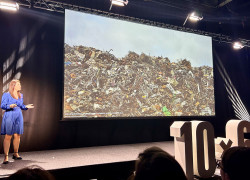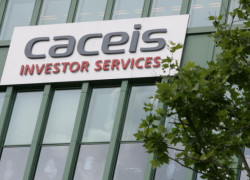Global decarbonisation rate doubles in 2014 but still not enough to limit global average temperature rise to 2°C
2014 suggests signs of a turning point in major international economies reducing their carbon emissions per unit of GDP, according to new analysis by PwC of the G20 economies.
This seventh annual Low Carbon Economy Index models major economies’ carbon intensity - the measure of energy related greenhouse gas emissions per million dollars of GDP. It shows carbon intensity has fallen by 2.7% in 2014, the steepest decline in seven years of the PwC analysis. Despite ambitious national emission reduction targets, the report warns that business needs to build carbon costs and regulation into business decisions, with the power, transport and finance sectors particularly affected
Carbon intensity of the G20 economies has fallen by 2.7% in 2014…
Global growth of 3.2% in 2014 was achieved with only 0.5% growth in energy related emissions. Breaking the link between emissions and economic growth – or ‘uncoupling’ – is essential to avoid the worst impacts of climate change. With less than 40 days to go before Governments meet in Paris to agree how to tackle climate change, the analysis indicates positive signs of ‘uncoupling’.
- 2014 is the first year that more than one country (UK, France, Germany and Italy as well as the EU as a whole) achieved a decarbonisation rate of 6.3% or above, the rate required globally to limit warming to two degrees. The UK achieves a record breaking 10.9% reduction in carbon intensity – the result of a strong economy, lower coal use and a warmer winter, followed by France (-9.1%), Italy (-7.8%) and Germany (-7.1%).
- China, the world’s largest emitter, is the best performing non-EU country in the table, with a decarbonisation rate of 6%. Australia has slipped from the top spot, but it still recorded a decarbonisation rate of 4.7%.
- Carbon intensity actually rose in five countries: South Africa, India, Brazil, Saudi Arabia and Turkey.
Laurent Rouach, partner and Sustainability Leader, comments: “What we’re seeing is the first signs of the decoupling of growth from carbon. The trend in Chinese emissions looks like it’s starting to turn, and renewables are on the up. But we’re not there yet. And the Paris pledges don’t get us there either. The real tipping point is when renewables hit cost parity with fossil fuels.”
…But decarbonisation of around 6.3% every year globally is needed in order to limit average temperature rise to 2°C.
Despite progress by some countries, globally, the target level of reductions in greenhouse gas emissions per unit of GDP has been missed for the seventh successive year. Rapid and sustained decarbonisation of around 6.3% is needed every year globally in order to limit global average temperature rise to 2°C.
In the lead up to the Paris 2015 conference on climate change, governments have submitted targets and plans on how they will tackle emissions. Known as INDCs (Intended Nationally Determined Contributions), these targets imply a global average decarbonisation rate of 3% per year – more than doubling the business as usual rate since 2000. These national plans are expected to drive action in the power, transport and finance sectors.
Many countries have put regulation of coal front and centre of their plans and are setting targets for renewables and low emissions vehicles. A significant shift in investments will be required to achieve these targets and build cleaner coal technology such as carbon capture and storage. The financial services sector will need to mobilise investors and create new financial products that fund and insure these projects. The automotive sector could expect government support into low or zero carbon next-generation vehicles in countries such as Japan and South Korea, or face more stringent fuel efficiency targets in others.
“CEO engagement on the Paris talks is mixed, but if there’s anything they should focus on, it’s the national plans proposed in the lead up to Paris. The Paris targets will have profound implications in terms of national regulation, investment and business planning. There’s a big focus on targets but little on getting investment needed to achieve them. Despite being a step change, the Paris targets fall short of the 2°C goal, so the Paris agreement will need a process to review national progress and to raise ambition in future” concludes Laurent Rouach.
While recognised in the report as a positive step change in decarbonisation, these Paris targets, if they are achieved, would only limit warming to 3°C by the end of the century.
To download the report, please visit www.pwc.lu/en/sustainability/docs/pwc-sustainability-conscious-uncoupling.pdf
Communiqués liés
La réponse de Luxair aux défis de brouillage GPS
Récemment, des incidents de brouillage GPS ont été signalés dans l'industrie...
Drees & Sommer chez 10x6 : Aperçu de la vision du New Europ...
Drees & Sommer Luxembourg a le plaisir d'annoncer sa participation à l'événem...
Un résultat courant en hausse de 7,5 % par rapport à l’e...
Dans un climat incertain, Banque Raiffeisen reste fidèle à ses valeurs et à s...
NMB Bank brings East Africa’s first sustainability bond to...
Just over a year after listing the first Sub-Saharan Africa gender bond on the L...
Allen & Overy announces first promotions in Luxembourg for A...
Allen & Overy (A&O) has announced the promotion of two new partners, three new c...
Il n'y a aucun résultat pour votre recherche







